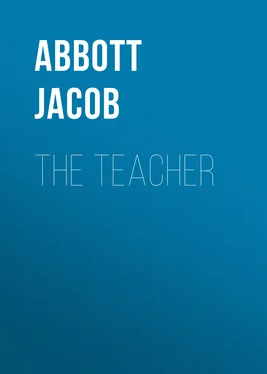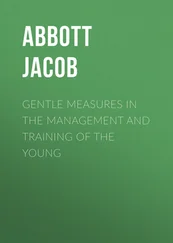Jacob Abbott - The Teacher
Здесь есть возможность читать онлайн «Jacob Abbott - The Teacher» — ознакомительный отрывок электронной книги совершенно бесплатно, а после прочтения отрывка купить полную версию. В некоторых случаях можно слушать аудио, скачать через торрент в формате fb2 и присутствует краткое содержание. Жанр: foreign_edu, pedagogy_book, на английском языке. Описание произведения, (предисловие) а так же отзывы посетителей доступны на портале библиотеки ЛибКат.
- Название:The Teacher
- Автор:
- Жанр:
- Год:неизвестен
- ISBN:нет данных
- Рейтинг книги:5 / 5. Голосов: 1
-
Избранное:Добавить в избранное
- Отзывы:
-
Ваша оценка:
- 100
- 1
- 2
- 3
- 4
- 5
The Teacher: краткое содержание, описание и аннотация
Предлагаем к чтению аннотацию, описание, краткое содержание или предисловие (зависит от того, что написал сам автор книги «The Teacher»). Если вы не нашли необходимую информацию о книге — напишите в комментариях, мы постараемся отыскать её.
The Teacher — читать онлайн ознакомительный отрывок
Ниже представлен текст книги, разбитый по страницам. Система сохранения места последней прочитанной страницы, позволяет с удобством читать онлайн бесплатно книгу «The Teacher», без необходимости каждый раз заново искать на чём Вы остановились. Поставьте закладку, и сможете в любой момент перейти на страницу, на которой закончили чтение.
Интервал:
Закладка:
It is not probable, however, that every one would be prepared the next day, in such a case; but, by acting steadily on these principles, the number of delinquencies would be so much diminished, that the very few which should be left, could easily be examined in detail, and the remedies applied.
Simultaneous recitation, by which I mean the practice of addressing a question to all the class, to be answered by all together, is a practice, which has been for some years rapidly extending in our schools, and, if adopted with proper limits and restrictions, is attended with great advantage. The teacher must guard against some dangers, however, which will be likely to attend it.
1. Some will answer very eagerly, instantly after the question is completed. They wish to show their superior readiness. Let the teacher mention this, expose, kindly, the motive which leads to it, and tell them it is as irregular to answer before the rest, as after them.
2. Some will defer their answers, until they can catch those of their comrades, for a guide. Let the teacher mention this fault, expose the motive which leads to it, and tell them that, if they do not answer independently, and at once, they had better not answer at all.
3. Some will not answer at all. The teacher can tell by looking around the class who do not, for they cannot counterfeit the proper motion of the lips, with promptness and decision, unless they know what the answer is to be. He ought occasionally to say to such an one, "I perceive you do not answer;" and ask him questions individually.
4. In some cases, there is danger of confusion in the answers, from the fact that the question may be of such a nature, that the answer is long, and may, by different individuals, be differently expressed. This evil must be guarded against, by so shaping the question, as to admit of a reply in a single word. In reading large numbers, for example, each figure may be called for by itself, or they may be given one after another, the pupils keeping exact time. When it is desirable to ask a question to which the answer is necessarily long, it may be addressed to an individual, or the whole class may write their replies, which may then be read in succession.
In a great many cases where simultaneous answering is practised, after a short time, the evils above specified are allowed to grow, until at last some half dozen bright members of a class answer for all, the rest dragging after them, echoing their replies, or ceasing to take any interest in an exercise, which brings no personal and individual responsibility upon them. To prevent this the teacher should exercise double vigilance, at such a time. He should often address questions to individuals alone, especially to those most likely to be inattentive and careless, and guard against the ingress of every abuse, which might, without close vigilance, appear.
With these cautions, the method here alluded to will be found to be of very great advantage in many studies; for example, all the arithmetical tables may be recited in this way; words may be spelled, answers to sums given; columns of figures added, or numbers multiplied; and many questions in History, Geography, and other miscellaneous studies, answered, especially the general questions asked for the purpose of a review.
But besides being useful as a mode of examination, this plan of answering questions simultaneously, is a very important means of fixing in the mind, any facts, which the teacher may communicate to his pupils. If, for instance, he says some day to a class, that Vasco de Gama was the discoverer of the passage round the Cape of Good Hope, and leaves it here, in a few days, not one in twenty, will recollect the name. But let him call upon them all to spell it, simultaneously, and then to pronounce it distinctly, three or four times in concert, and the word will be very strongly impressed upon the mind. The reflecting teacher will find a thousand cases, in the instruction of his classes, and in his general exercises, in the school, in which this principle will be of great utility. It is universal in its application. What we say , we fix by the very act of saying it, in the mind. Hence reading aloud, though a slower, is a far more thorough method, than reading silently; and it is better, in almost all cases, whether in the family, or in sabbath, or common schools, when general instructions are given, to have the leading points fixed in the mind, by questions, answered simultaneously.
But we are wandering a little from our subject; which is, in this part of our chapter, the methods of examining a class, not of giving or fixing instructions.
Another mode of examining classes, which it is important to describe, consists in requiring written answers to the questions asked. The form and manner, in which this plan may be adopted, is various. The class may bring their slates to the recitation, and the teacher may propose questions successively, the answers to which all the class may write, numbering them carefully. After a dozen answers are written, the teacher may call, at random, for them; or he may repeat a question, and ask each pupil to read the answer he had written; or he may examine the slates. Perhaps this method may be very successfully employed in reviews, by dictating to the class, a list of questions, relating to the ground they have gone over, for a week, and to which they are to prepare answers, written out at length, and to be brought in at the next exercise. This method may be made more formal still, by requiring a class to write a full and regular abstract of all they have learned, during a specified time. The practice of thus reducing to writing what has been learned, will be attended with many advantages, so obvious that they need not be described.
It will be perceived that three methods of examining classes have now been named, and these will afford the teacher the means of introducing a very great variety, in his mode of conducting his recitations, while he still carries his class forward steadily in their prescribed course. Each is attended with its peculiar advantages. The single replies , coming from individuals specially addressed, are more rigid, and more to be relied upon;—but they consume a great deal of time, and while one is questioned, it requires much skill, to keep up interest in the rest. The simultaneous answers of a class awaken more general interest, but it is difficult, without special care, to secure, by this means, a thorough examination of all. The written replies , are more thorough, but they require more time, and attention, and while they habituate the pupil to express his thoughts in writing, they would, if exclusively adopted, fail to accustom him to an equally important practice, that of the oral communication of his thoughts. A constant variety, of which these three methods should be the elements, is unquestionably the best mode. We not only, by this means, secure in a great degree the advantages which each is fitted to produce, but we gain, also, the additional advantage and interest of variety.
By these, and perhaps by other means, it is the duty of the teacher to satisfy himself that his pupils are really attentive to their duties. It is not perhaps necessary, that every individual should be, every day, minutely examined; this is, in many cases, impossible. But the system of examination should be so framed, and so administered, as to be daily felt by all, and to bring upon every one, a daily responsibility.
We come now to consider the second general head, which was to be discussed in this chapter.
The study of books alone, is insufficient to give knowledge to the young. In the first stage, learning to read, a book is of no use whatever, without the voice of the living teacher. The child cannot take a step alone. As the pupil, however, advances in his course, his dependence upon his teacher for guidance and help, continually diminishes, until, at last, the scholar sits in his solitary study, with no companion but his books, and desiring, for a solution of every difficulty, nothing but a larger library. In schools, however, the pupils have made so little progress in this course, that they all need more or less of this oral assistance. Difficulties must be explained; questions must be answered; the path must be smoothed, and the way pointed out, by a guide, who has travelled it before, or it will be impossible for the pupil to go on. This is the part of our subject, which we now approach.
Читать дальшеИнтервал:
Закладка:
Похожие книги на «The Teacher»
Представляем Вашему вниманию похожие книги на «The Teacher» списком для выбора. Мы отобрали схожую по названию и смыслу литературу в надежде предоставить читателям больше вариантов отыскать новые, интересные, ещё непрочитанные произведения.
Обсуждение, отзывы о книге «The Teacher» и просто собственные мнения читателей. Оставьте ваши комментарии, напишите, что Вы думаете о произведении, его смысле или главных героях. Укажите что конкретно понравилось, а что нет, и почему Вы так считаете.












